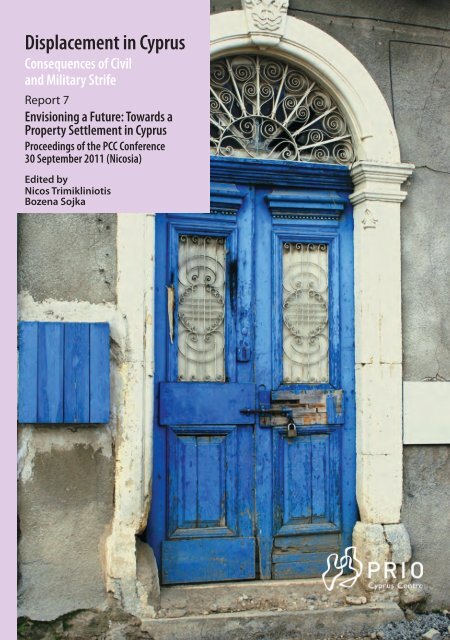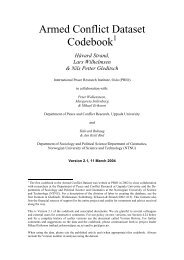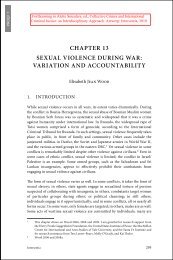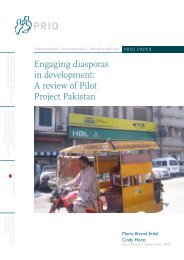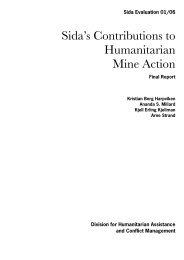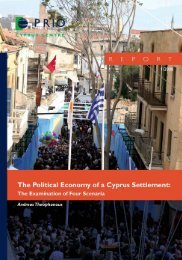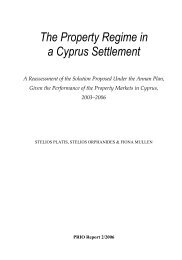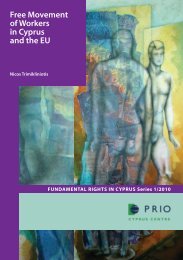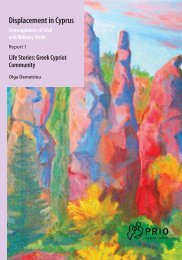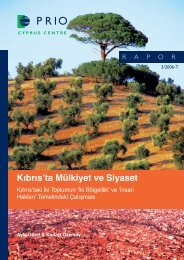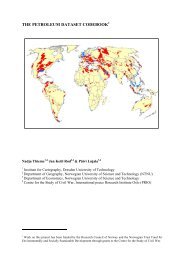Towards a Property Settlement in Cyprus - PRIO
Towards a Property Settlement in Cyprus - PRIO
Towards a Property Settlement in Cyprus - PRIO
Create successful ePaper yourself
Turn your PDF publications into a flip-book with our unique Google optimized e-Paper software.
Displacement <strong>in</strong> <strong>Cyprus</strong><br />
Consequences of Civil<br />
and Military Strife<br />
Report 7<br />
Envision<strong>in</strong>g a Future: <strong>Towards</strong> a<br />
<strong>Property</strong> <strong>Settlement</strong> <strong>in</strong> <strong>Cyprus</strong><br />
Proceed<strong>in</strong>gs of the PCC Conference<br />
30 September 2011 (Nicosia)<br />
Edited by<br />
Nicos Trimikl<strong>in</strong>iotis<br />
Bozena Sojka
About the editors<br />
Nicos Trimikl<strong>in</strong>iotis is an <strong>in</strong>terdiscipl<strong>in</strong>ary scholar work<strong>in</strong>g <strong>in</strong> the fields of sociology<br />
and law. He is, s<strong>in</strong>ce 2008, senior research consultant at <strong>PRIO</strong> <strong>Cyprus</strong> Centre. Also he<br />
is Associate Professor of Law and Sociology at the University of Nicosia and honorary<br />
research associate of the University of Cape Town, South Africa. He has researched<br />
widely on human rights, discrim<strong>in</strong>ation, migration, gender, reconciliation, ethnic<br />
conflict and racism, constitutional, education and labour issues and has published<br />
several articles <strong>in</strong> books and journals. His latest work <strong>in</strong>clude: Beyond a Divided <strong>Cyprus</strong>:<br />
A State and Society <strong>in</strong> Transformation, co-authored and co-edited with Umut Bozkurt<br />
(Palgrave MacMillan, 2012); and Η Διαλεκτική του Έθνους-Κράτους και το Καθεστώς<br />
Εξαίρεσης: Κοινωνιολογικές και Συνταγματικές Μελέτες για την Ευρω-Κυπριακή Συγκυρία<br />
και το Εθνικό Ζήτημα [The Nation-State Dialectic and the State of Exception] (Savalas,<br />
Athens, 2010). E-mail: nicostrim@gmail.com<br />
Bozena Sojka is a Doctoral candidate at Swansea University and a Research Associate<br />
at the Centre for Migration Policy Research (CMPR). She did an <strong>in</strong>ternship with <strong>PRIO</strong><br />
<strong>Cyprus</strong> Centre dur<strong>in</strong>g the end of 2011.
Displacement <strong>in</strong> cyprus<br />
consequences of<br />
civil anD military strife<br />
report 7<br />
ENVISIONING A FUTURE:<br />
TOWARDS A PROPERTY SETTLEMENT<br />
IN CYPRUS<br />
proceed<strong>in</strong>gs of the pcc conference<br />
30 september 2011 (nicosia)<br />
Edited by<br />
Nicos Trimikl<strong>in</strong>iotis<br />
and<br />
Bozena Sojka
Peace Research Institute Oslo (<strong>PRIO</strong>)<br />
Hausmanns gate 7<br />
po Box 9229 oslo<br />
no-0134 oslo, norway<br />
tel. +47 22 54 77 00<br />
fax +47 22 54 77 01<br />
email: <strong>in</strong>fo@prio.no<br />
Web: www.prio.no<br />
prio encourages its researchers and research affiliates to publish their work <strong>in</strong> peer reviewed<br />
journals and book series, as well as <strong>in</strong> prio’s own report, paper and policy Brief series. <strong>in</strong><br />
edit<strong>in</strong>g these series, we undertake a basic quality control, but prio does not as such have<br />
any view on political issues. We encourage our researchers actively to take part <strong>in</strong> public<br />
debates and give them full freedom of op<strong>in</strong>ion. the responsibility and honour for the<br />
hypotheses, theories, f<strong>in</strong>d<strong>in</strong>gs and views expressed <strong>in</strong> our publications thus rests with the<br />
authors themselves.<br />
the texts compiled <strong>in</strong> this publication <strong>in</strong>clud<strong>in</strong>g the term<strong>in</strong>ology used lay <strong>in</strong> the sole<br />
responsibility of the author(s) and/or the peace research <strong>in</strong>stitute oslo (prio)as one of the<br />
beneficiaries of the eu funded project ‘Dialogue for trust-Build<strong>in</strong>g and reconciliation:<br />
cypriots seek<strong>in</strong>g new approaches to the property issue‘. <strong>in</strong> no way can the content of this<br />
publication be attributed to the european commission. the eu does not recognise the<br />
"turkish republic of northern cyprus" but only the republic of cyprus, its member state.<br />
© peace research <strong>in</strong>stitute oslo (prio), 2012<br />
all rights reserved. no part of this publication may be reproduced, stored <strong>in</strong> a retrieval system or utilized <strong>in</strong><br />
any form or by any means, electronic, mechanical, photocopy<strong>in</strong>g, record<strong>in</strong>g, or otherwise, without permission<br />
<strong>in</strong> writ<strong>in</strong>g from the copyright holder(s).<br />
isBn 978-82-7288-432-0<br />
Cover photograph: Bente Karlsen<br />
Production and Cover design: action Global communications
CONTENTS<br />
SUMMARY .1<br />
WELCOME .9<br />
GREG REICHBERG<br />
DISPLACEMENT IN CYPRUS AND THE PROPERTY ISSUE .13<br />
AYLA GUREL<br />
FRAMING THE SETTLEMENT AND PROPERTY QUESTION IN CYPRUS .17<br />
NICOS TRIMIKLINIOTIS
1<br />
SUMMARY<br />
the conference took place on 30th september 2011 at the Home for cooperation <strong>in</strong><br />
nicosia’s Buffer Zone and the topic was property issues with<strong>in</strong> the context of displace -<br />
ment <strong>in</strong> cyprus.<br />
the conference started with a welcome word from Gregory reichberg, Director of prio cyprus<br />
centre. shortly after the <strong>in</strong>troductory comments, he also presented the launch of prio cyprus<br />
centre’s project website ‘Displacement <strong>in</strong> cyprus: mapp<strong>in</strong>g the consequences of civil and<br />
military strife’ which is an <strong>in</strong>formation resource for civil society and the broader <strong>in</strong>terna tional<br />
community as well as for journalists and researchers <strong>in</strong>terested <strong>in</strong> the cyprus issue.<br />
this <strong>in</strong>troduction was followed by two sessions. the first dealt with fram<strong>in</strong>g the property<br />
issues which was followed by second part of the conference where models for property<br />
settlements were discussed.<br />
the conference was jo<strong>in</strong>tly funded by the european union and unDp-act. it was a part of<br />
the project ‘Dialogue for trust Build<strong>in</strong>g and reconciliation’. this project itself is funded by<br />
european union and implemented by prio.<br />
Fram<strong>in</strong>g the property issue: the experiences of displacement<br />
this session began with sett<strong>in</strong>g the context for the displacement and property issues <strong>in</strong> cyprus<br />
by ayla Gürel and nicos trimikl<strong>in</strong>iotis. ayla Gürel presented the history of displacement <strong>in</strong><br />
cyprus from the 1960s to events of 1974. after describ<strong>in</strong>g the basic facts and figures, she stated<br />
that property issues <strong>in</strong> divided cyprus are complex and far from simple to solve. she argued<br />
that the most important question which should be addressed is ‘how can the two cypriot sides<br />
be persuaded to accept such a solution?’ this was followed by a talk by nicos trimikl<strong>in</strong>iotis, for<br />
whom the complexity of the displacement and settlement issue <strong>in</strong> cyprus calls for a framework<br />
of seek<strong>in</strong>g practical, workable and mutually agreeable and fair solutions, someth<strong>in</strong>g possible<br />
with good will.<br />
mete Hatay and symeon matsis discussed the consequences of displacement <strong>in</strong> both sides<br />
of the island and potential solutions for the issues surround<strong>in</strong>g it. Both agreed that transparent<br />
polices could help but at the same time they noted that the implementation of these will be<br />
more difficult because of already exist<strong>in</strong>g public debates. Hatay traced turkish cypriot<br />
displacement from the late 1950s, to 1963-64 and 1974. He presented the complexities and the<br />
various policy responses to the forced migration and displacement <strong>in</strong> the three periods, and<br />
concluded with the post-1974 situation and the current policy regime, which is governed by
2 envision<strong>in</strong>g a future: towards a property settlement <strong>in</strong> cyprus<br />
various <strong>in</strong>struments. matsis dealt with the post-august 1974 situation, which he described as<br />
‘a planners nightmare’, given that economic activity collapsed by one-third, partly because of<br />
the withdrawal of turkish cypriots and 47% reduction <strong>in</strong> ga<strong>in</strong>ful employment - from 253,000<br />
<strong>in</strong> 1973 to 135,000 <strong>in</strong> 1975. the result was the creation of a massive unemployment problem,<br />
which for the second half of 1974 was measured at 29.6% of the economically active<br />
population, as well as loss of productive resources <strong>in</strong> all sectors, particularly heavy <strong>in</strong> tourism,<br />
agriculture, m<strong>in</strong><strong>in</strong>g and transport <strong>in</strong> what was then a closely <strong>in</strong>tegrated economy. the<br />
displacement of thousands of (160,000) persons meant the excessive dependence of people<br />
on the state to provide means of subsistence. He presented the variety of implemented policies<br />
emphasiz<strong>in</strong>g the radical change <strong>in</strong> fiscal policy, which became Keynesian, expansionary with<br />
very high deficits f<strong>in</strong>anced from foreign borrow<strong>in</strong>g. this contrasted with the conservative fiscal<br />
policies pursued from 1960-1973 characterized by fiscal surpluses and very low government<br />
debt. the government pursued expansionary economic policies, implemented large hous<strong>in</strong>g<br />
programmes, provided <strong>in</strong>centives to the unemployed, and expanded educational and health<br />
policies. He concluded that we can learn from exam<strong>in</strong><strong>in</strong>g the policies <strong>in</strong> different fields<br />
implemented after 1974.<br />
policies were flexible through adoption of radical new measures, which could be abandoned<br />
when circumstances changed.<br />
n<br />
n<br />
n<br />
n<br />
n<br />
the country has the collective experience to formulate and implement appropriate policies.<br />
there must be flexibility to re<strong>in</strong>vent these policies if and when they are needed because<br />
of a solution.<br />
there must be capacity to implement policies to meet hous<strong>in</strong>g demands for those to be<br />
displaced and move to areas adm<strong>in</strong>istered by one or the other constituent government.<br />
Be <strong>in</strong> a position to implement both economic and social policies to meet a different set of<br />
circumstances.<br />
implementation will be more difficult because of already exist<strong>in</strong>g public debts.<br />
then the documentary movie ‘still’ by alana Kakoyiannis was shown, which reflects on the<br />
notion of ‘home’ for Greek and turkish cypriots.<br />
Life stories and memories of people <strong>in</strong>volved <strong>in</strong> displacement and<br />
settlement<br />
the next session <strong>in</strong>cluded the presentation of life stories by rebecca Bryant and olga<br />
Demetriou. this part of the event concentrated on memories of people <strong>in</strong>volved <strong>in</strong> displacement<br />
and settlement. it showed that analys<strong>in</strong>g the complicated ways <strong>in</strong> which these people th<strong>in</strong>k<br />
about their displacement allows us helped to assess the situation <strong>in</strong> depth and offered <strong>in</strong>sights<br />
<strong>in</strong>to potential solutions.<br />
Demetriou exam<strong>in</strong>ed the Greek cypriot narratives based on their experience with violence,<br />
displacement and the long<strong>in</strong>g to return. Her presentation concentrated on the factors that
Summary<br />
3<br />
affect the diversity of displacement experience and the ways <strong>in</strong> which it is recounted, such as<br />
location, class, gender, ethnicity, age at displacement, relation to properties post-displacement,<br />
circumstances of displacement, etc.<br />
<strong>in</strong> an overview of the sample of fifteen <strong>in</strong>terviews exam<strong>in</strong>ed <strong>in</strong>-depth, Demetriou com -<br />
mented on the significance of hear<strong>in</strong>g the voices of the displaced that are not so often <strong>in</strong>cluded<br />
<strong>in</strong> the recount<strong>in</strong>g of ‘the refugee experience’ – the <strong>in</strong>clusion of life stories from members of<br />
m<strong>in</strong>ority groups such as armenians, maronites, and lat<strong>in</strong>s, is a case <strong>in</strong> po<strong>in</strong>t.<br />
equally important, she noted, is the attention to the stories of those who have been<br />
exposed to the media and public scrut<strong>in</strong>y due to their displacement experience, as, for<br />
example, the litigants on property cases heard before local courts and the ectHr, who may<br />
recount this experience differently to the ways <strong>in</strong> which the media presents them.<br />
Bryant presented the story as narrated by a sample of 30 life history <strong>in</strong>terviews with persons<br />
now resident <strong>in</strong> morphou/Güzelyurt, Kyrenia/Girne, and yialousa/yenierenköy. these places<br />
were chosen both because of the populations currently resident there and also because they<br />
would probably be differently affected by a property solution. By show<strong>in</strong>g the complicated<br />
and often contradictory ways <strong>in</strong> which persons th<strong>in</strong>k about their displacement and property,<br />
life histories give us different <strong>in</strong>sights <strong>in</strong>to potential solutions than does a survey. the difference<br />
<strong>in</strong> property values north and south today plays a significant role <strong>in</strong> the ways that tcs are th<strong>in</strong>k<strong>in</strong>g<br />
about possible political solutions. she concluded with the follow<strong>in</strong>g general observations:<br />
n<br />
n<br />
attention to generational differences shows us that tc approaches to the places that they<br />
left beh<strong>in</strong>d are more complex than ‘forgett<strong>in</strong>g’ or ‘remember<strong>in</strong>g’. While the now middleaged<br />
generation is often nostalgic for a place they hardly remember, their parents ‘remem -<br />
ber <strong>in</strong> order to forget’. youth today show none of the ‘postmemory’ prevalent amongst<br />
children of Gc iDps.<br />
although party affiliation plays an important role <strong>in</strong> perceptions of the past and future,<br />
even those leftists who tend to have more regular contact with Greek cypriots today express<br />
concern that turkish cypriots should not be displaced aga<strong>in</strong> <strong>in</strong> the event of a solution.<br />
The f<strong>in</strong>d<strong>in</strong>gs from focus groups on experiences of displacement and property-related<br />
concerns and expectations were described by ayla Gürel, christalla yak<strong>in</strong>thou and nicos<br />
trimikl<strong>in</strong>iotis with the agreement that there are common feel<strong>in</strong>gs of ‘fatigue about the past’ and<br />
‘cynicism about the peace processes’ among both Greek and turkish cypriots.<br />
this was also commented on by ahmet sözen, who espressed his hopes and fears<br />
regard<strong>in</strong>g a property solution <strong>in</strong> the near future [which was listed <strong>in</strong> the cyprus 2015 project.]<br />
He highlighted that people share a concern for equity and for the valuations of properties <strong>in</strong><br />
the future and th<strong>in</strong>ks that the status quo is not susta<strong>in</strong>able and impossible at present. sözen’s<br />
presentation of the f<strong>in</strong>d<strong>in</strong>gs focused on people’s hopes and fears regard<strong>in</strong>g a property set -<br />
tlement <strong>in</strong> case of non-solution of the cyprus problem as well as <strong>in</strong> case of a federal solution<br />
(based on the established un parameters). He noted that positions of pr<strong>in</strong>ciple on the property
4 envision<strong>in</strong>g a future: towards a property settlement <strong>in</strong> cyprus<br />
issue tend to obstruct constructive dialogue on how to resolve the matter of affected proper -<br />
ties. <strong>in</strong>terest<strong>in</strong>gly, he underscored that ultimately people share a concern for equity and for<br />
the valuations of properties <strong>in</strong> the context of a settlement that would <strong>in</strong>volve some properties<br />
be<strong>in</strong>g exchanged or compensated (<strong>in</strong> addition to restitution). However, time is runn<strong>in</strong>g out,<br />
as the property problem grows by the day <strong>in</strong> the form of exchanges and development of<br />
property among turkish cypriots. He considered that this is not just generally bad for the<br />
environment, as ma<strong>in</strong>ta<strong>in</strong>ed by one stakeholder, but will also further complicate the property<br />
issue and make it impossible to return the majority of properties to their Greek cypriot<br />
owners <strong>in</strong> the event of a future settlement agreement.<br />
Current state of the property negotiations<br />
this was followed by erol Kaymak and alexandros lordos, who discussed the current state of<br />
the property question and various proposals of the two sides on the negotiation table. they<br />
presented the ma<strong>in</strong> arguments, obstacles and stumbl<strong>in</strong>g po<strong>in</strong>ts <strong>in</strong> the negotiations which<br />
illustrate the complexity and difficulty of the property question <strong>in</strong> cyprus. a workable solution<br />
is possible but the necessary good will by both sides is needed to match the needs and<br />
concerns of Greek cypriots and turkish cypriots, both displaced persons and current users <strong>in</strong><br />
a future settlement.<br />
<strong>in</strong> his presentation, erol Kaymak outl<strong>in</strong>ed the current status of the ongo<strong>in</strong>g negotiations<br />
<strong>in</strong> the property dossier. the sides had converged on the need to determ<strong>in</strong>e dist<strong>in</strong>ct categories<br />
of properties. moreover, there was also convergence regard<strong>in</strong>g the need for a variety of reme -<br />
dies, <strong>in</strong>clud<strong>in</strong>g re<strong>in</strong>statement, compensation, and exchange. the sides also agree <strong>in</strong> pr<strong>in</strong>ciple<br />
on the need to establish <strong>in</strong>stitutions, <strong>in</strong>clud<strong>in</strong>g a property commission and a property court<br />
for appeals. However, the sides rema<strong>in</strong>ed fundamentally at odds regard<strong>in</strong>g criteria to deter -<br />
m<strong>in</strong>e outcomes. accord<strong>in</strong>gly, the Greek cypriot position rema<strong>in</strong>s that orig<strong>in</strong>al/ dispossessed<br />
owner must decide on the fate of the property. aga<strong>in</strong>st this, the turkish cypriot position<br />
favors objective criteria for determ<strong>in</strong><strong>in</strong>g the fate of (different categories of) properties. <strong>in</strong><br />
either case, ultimate decisions would be processed by an autonomous property commission.<br />
However, the sides disagree on the authority to be vested. Divergences rema<strong>in</strong> on who would<br />
decide the fate of the affected property and on what basis. the Greek cypriot position is that<br />
dispossessed owners must be able to decide, whereas the turkish cypriot side prefers objec -<br />
tive criteria to be established that would guide the commission <strong>in</strong> mak<strong>in</strong>g determ<strong>in</strong>ations. the<br />
turkish cypriot concern is that the Greek cypriot position would potentially underm<strong>in</strong>e bizonality<br />
(i.e., ‘a clear majority of property ownership and population’), s<strong>in</strong>ce the implication<br />
might be that many dispossessed owners opt for re<strong>in</strong>statement. recent ecHr decisions<br />
suggest that the <strong>in</strong>terests of current users should be balanced with ownership rights (i.e., the<br />
notion of ‘compet<strong>in</strong>g rights’). Hence, the turkish cypriot position envisions (limited) re<strong>in</strong>state -<br />
ment of properties to orig<strong>in</strong>al owners. Just as the sides have not agreed on criteria, similarly<br />
there is no agreement on any ‘caps’ on re<strong>in</strong>statement. Despite these differences, the sides
Summary<br />
5<br />
cont<strong>in</strong>ued to explore the means of compensation <strong>in</strong> the event of a settlement. potentially the<br />
sides could converge on a formula that l<strong>in</strong>ks compensation to the value of property at the<br />
po<strong>in</strong>t of sale. the Greek cypriot side envisions public debt issued by the property commission<br />
while imply<strong>in</strong>g that current users also contribute. compensation payments would be l<strong>in</strong>ked<br />
to the value of property over time. the turkish cypriot side elaborated a ‘Guaranteed f<strong>in</strong>ancial<br />
entitlement’ (Gfe) that would be payable and guaranteed by the turkish cypriot constituent<br />
state. through the government it would be possible to collect funds to pay the Gfes from<br />
current users who ga<strong>in</strong> title entail<strong>in</strong>g a hybrid form of property and capital ga<strong>in</strong>s tax, where<br />
tax is l<strong>in</strong>ked to value. on the matter of exchange, less convergence is evident. the turkish<br />
side put forward a unique, but somewhat controversial proposal, to establish a property<br />
Development corporation (pDc). the pDc would develop ‘adversely affected property’. the<br />
model is based on the practice of ‘urban transformation’ (i.e., grand improve ment plans)<br />
implemented <strong>in</strong> a variety of countries. the turkish cypriots say this is to ensure fair basis for<br />
exchange, s<strong>in</strong>ce many turkish cypriot properties that rema<strong>in</strong> are relatively low <strong>in</strong> value. the<br />
turkish cypriot side contends that urban transformation would serve to release ‘trapped<br />
value’. the turkish cypriot side contends that many of the affected properties are ‘structurally<br />
depressed’, s<strong>in</strong>ce the values (of the turkish cypriot properties <strong>in</strong> the south) are mostly due to<br />
zon<strong>in</strong>g and the guardian laws that preempted development. By contrast, affected Greek<br />
cypriot properties <strong>in</strong> north are developed (and benefit from newer <strong>in</strong>fra structure). so far, the<br />
Greek cypriot side has not rejected urban transformation outright, s<strong>in</strong>ce it may make<br />
exchange more attractive. the two sides have spent as much energy try<strong>in</strong>g to conv<strong>in</strong>ce the<br />
mediators of the merits of their respective positions as they have strived to conv<strong>in</strong>ce one<br />
another. mediators seem to th<strong>in</strong>k territory and property issues can be l<strong>in</strong>ked; someth<strong>in</strong>g the<br />
Greek cypriot side has recommended. it is assumed that Greek cypriots might accept less<br />
property re<strong>in</strong>statement (<strong>in</strong> the turkish cypriot constituent state) <strong>in</strong> return for more territory.<br />
the Greek cypriot side asks for 100,000 (out of 162,000 displaced persons) to be allowed to<br />
return as a result of territorial adjustment. these figures imply <strong>in</strong>direct nego tiations regard<strong>in</strong>g<br />
the Karpass/Karpaz pen<strong>in</strong>sula. However, as of the conference, the sides had not discussed<br />
numbers or maps (supposedly to be left to the f<strong>in</strong>al ‘give and take’ stage of the formal round<br />
of negotiations). Kaymak concluded by reflect<strong>in</strong>g on the potential for reconcil<strong>in</strong>g the two<br />
positions. He noted that some experts and mediators suggest a model of ‘hierarchy’ whereby<br />
owners and current users, as opposed to properties, are categorized (which is the logic of the<br />
ecHr actually; determ<strong>in</strong><strong>in</strong>g how to resolve compet<strong>in</strong>g <strong>in</strong>terests). thus, it is assumed that<br />
liv<strong>in</strong>g displaced persons might be high <strong>in</strong> the hierarchy (thus among those to exercise first<br />
right of refusal). similar rank<strong>in</strong>g categories could be made among current users and com -<br />
pet<strong>in</strong>g rights assessed <strong>in</strong> a matrix. ultimately any agreement would require approval <strong>in</strong><br />
referenda, so the particular model must satisfy the majority and be deemed equitable.
6 envision<strong>in</strong>g a future: towards a property settlement <strong>in</strong> cyprus<br />
<strong>Property</strong> challenges ahead: f<strong>in</strong>ance, markets and costs<br />
fiona mullen discussed the property challenge ahead which could be divided <strong>in</strong>to the fol -<br />
low<strong>in</strong>g areas: the current state of the real estate market; scenarios for f<strong>in</strong>anc<strong>in</strong>g needs;<br />
compensation cost, which consists of three valuation scenarios; the resettlement cost which<br />
consists of four scenarios. she concluded with some thoughts on deal<strong>in</strong>g with the challenges:<br />
n<br />
n<br />
n<br />
n<br />
n<br />
n<br />
Big gap between expectations and payouts<br />
compensation costs range €8bn-€19bn<br />
rehous<strong>in</strong>g costs could range €1bn-€2.5bn<br />
even €9bn is 45% of GDp<br />
Big spend<strong>in</strong>g or borrow<strong>in</strong>g needs careful management <strong>in</strong> a eurozone economy<br />
f<strong>in</strong>anciers will demand a ‘story’<br />
the next panel deal dealt with the issue of Resettlement, susta<strong>in</strong>able development, and<br />
plann<strong>in</strong>g. speakers <strong>in</strong>cluded pavlos loizou, nicos trimikl<strong>in</strong>iotis and Hans K. l<strong>in</strong>gsom; it was<br />
followed by a lively debate.<br />
pavlos loizou addressed the question of the dilemmas regard<strong>in</strong>g plann<strong>in</strong>g and regenera -<br />
tion as a means to an end. He considered that regeneration and susta<strong>in</strong>ability essentially<br />
mean the creation of communities, not construction; regeneration needs to stem from the<br />
<strong>in</strong>teraction with the community, <strong>in</strong> order to develop trust; and trust will result <strong>in</strong> <strong>in</strong>creased<br />
community cohesion, whose absence will lead to failure. He concluded that discussions<br />
should therefore be about use and people as we cannot look at property separately from the<br />
wider economy, or from society as a whole. He proposed that a national plan be drafted and<br />
that we look to others who were successful for ideas.<br />
nicos trimikl<strong>in</strong>iotis presented the paper on “Development and susta<strong>in</strong>ability - a vision for<br />
the future”, based on a paper co-authored by ioakimoglou, pantelides and trimikl<strong>in</strong>iotis. He<br />
addressed the question of development and susta<strong>in</strong>ability from a perspective which draws<br />
on ideas about the subject from different countries, but he emphasised that at the same time<br />
this must be properly grounded <strong>in</strong> the socio-economic and historical context of cyprus.<br />
otherwise it runs the risk of <strong>in</strong>troduc<strong>in</strong>g great ideas, <strong>in</strong>novative and <strong>in</strong>spir<strong>in</strong>g, as they have<br />
been developed and successfully applied <strong>in</strong> other contexts, but may result <strong>in</strong> abysmal failure<br />
when ‘planted’ <strong>in</strong> cyprus. the challenge of question<strong>in</strong>g and re-th<strong>in</strong>k<strong>in</strong>g the models of eco -<br />
nomic development we have on either side of the divid<strong>in</strong>g l<strong>in</strong>e <strong>in</strong> cyprus is considerable.<br />
consider<strong>in</strong>g the current context of negotiations for a political settlement, there is the addi -<br />
tional challenge of how to <strong>in</strong>tegrate the pr<strong>in</strong>ciples and <strong>in</strong>stitutional framework of susta<strong>in</strong>able<br />
development <strong>in</strong> the parameters of a solution to the cyprus problem and how relevant such<br />
susta<strong>in</strong>able development pr<strong>in</strong>ciples might be to aspects of the settlement such as economic<br />
governance or the property question. even though the direction for a susta<strong>in</strong>able model of<br />
economic development might be considered a difficult task, it is important at least to start<br />
th<strong>in</strong>k<strong>in</strong>g towards this objective. a political settlement <strong>in</strong> cyprus should not be seen as a set<br />
of political and legal arrangements which ‘solve the problem’. it should rather be considered<br />
as the beg<strong>in</strong>n<strong>in</strong>g for rebuild<strong>in</strong>g society.
Summary<br />
7<br />
the f<strong>in</strong>al speaker was Hans K. l<strong>in</strong>gsom, who spoke about fornebu, <strong>in</strong> norway, and the<br />
experience of transform<strong>in</strong>g an airport to a new city. from the outset key issues had to be<br />
resolved by ensur<strong>in</strong>g that ownership of airport grounds was to be shared by the public and<br />
private entities on the location, which was all with<strong>in</strong> the municipality of Baerum – 5 miles<br />
from the city center of oslo. the size of airport was 340 hectars (3.4 square km), out of which<br />
orig<strong>in</strong>ally 54 % was under state ownership and 46 % was owned by the city of oslo. the<br />
municipality of Baerum had no ownership – but it had the plann<strong>in</strong>g authority and was the<br />
provider of social <strong>in</strong>frastructure. coord<strong>in</strong>ation between the owners was very problematic. the<br />
strategy of the state was to sell the land to partially f<strong>in</strong>ance a new airport <strong>in</strong> another location,<br />
whilst the strategy of the city of oslo was to sell the land when the plann<strong>in</strong>g was completed.<br />
the ma<strong>in</strong> technical/green <strong>in</strong>frastructure was to build 200 mill euro (landowners). the state/<br />
oslo sold the planned areas to a developer for 400 mill euro. the social <strong>in</strong>frastructure <strong>in</strong> the<br />
1st phase was to build schools, etc., which cost 150 mill euro (municipality). the developer<br />
sold the project to another company and made a profit 300 mill euro. the assumption was at<br />
the outset there are several or many landowners with autonomous <strong>in</strong>terests and so there<br />
were various models considered for f<strong>in</strong>anc<strong>in</strong>g: model 1: landowners sell<strong>in</strong>g land to develo -<br />
per before start<strong>in</strong>g plann<strong>in</strong>g; model 2: sell<strong>in</strong>g land after plann<strong>in</strong>g but before development;<br />
model 3: (a) owners stick together through plann<strong>in</strong>g and development, each with a share<br />
correspond<strong>in</strong>g to the size of the lot they own. (b) make agreement with f<strong>in</strong>ancial <strong>in</strong>stitutions/<br />
developers. (c) value of land and dividends from development is paid out successively through<br />
development process – or <strong>in</strong> the end.<br />
all power po<strong>in</strong>ts are available on the website Displacement <strong>in</strong> <strong>Cyprus</strong>: consequences of civil<br />
and military strife at http://www.prio-cyprus-displacement.net/default.asp?id=776
9<br />
WELCOME<br />
Greg Reichberg, Director of the <strong>PRIO</strong> <strong>Cyprus</strong> Centre<br />
Good morn<strong>in</strong>g everyone. i am Greg reichberg, Director of the prio cyprus centre. on<br />
behalf of the centre i welcome you to the conference and thank you for tak<strong>in</strong>g time<br />
out of your busy schedules to be here.<br />
the prio cyprus centre (pcc) is a bi-communal organization committed to research, policy<br />
formulation, and dialogue. officially founded <strong>in</strong> 2005 (but with roots <strong>in</strong> cyprus go<strong>in</strong>g back to<br />
1997), the centre is a subsidiary of the peace research <strong>in</strong>stitute oslo. prio is an <strong>in</strong>dependent,<br />
<strong>in</strong>ternational and <strong>in</strong>terdiscipl<strong>in</strong>ary organization whose overarch<strong>in</strong>g purpose is to conduct<br />
research on the conditions for peaceful relations between states, groups and people. prio<br />
celebrated its 50th anniversary two years ago. the cyprus centre constitutes the only branch<br />
office of prio. the centre has always worked on the basis that it does not advocate any<br />
specific policy.<br />
this conference takes place with<strong>in</strong> the broader context of a complex property issue. as we<br />
all know, the question of disputed properties stands at the heart of the cyprus problem. the<br />
property issue exists because of the population displacements which occurred <strong>in</strong> cyprus<br />
beg<strong>in</strong>n<strong>in</strong>g <strong>in</strong> 1963 and then aga<strong>in</strong>, on a much larger scale, <strong>in</strong> 1974. Displacement had many<br />
effects; among other th<strong>in</strong>gs it produced widespread trauma and disrupted the social fabric<br />
of communities. it also upset property relations throughout the island. the effects of dis -<br />
place ment cont<strong>in</strong>ue to this day. <strong>in</strong> the first part of today’s program, this morn<strong>in</strong>g, we will<br />
explore how displacement was experienced by cypriots, and what policy responses on both<br />
sides of the island were implemented to deal with its consequences. the second part, this<br />
afternoon, will be forward look<strong>in</strong>g. tak<strong>in</strong>g as its start<strong>in</strong>g po<strong>in</strong>t the terms of a property<br />
settlement which have been proposed by the negotiation teams of the two sides, we will<br />
proceed to exam<strong>in</strong>e the current state of the property market <strong>in</strong> cyprus and what this means<br />
for a possible settlement. afterwards a panel of experts, each of whom has experience <strong>in</strong><br />
projects relat<strong>in</strong>g to susta<strong>in</strong>able development, will discuss the challenges, but also the considerable<br />
potentialities, for susta<strong>in</strong>able development <strong>in</strong> cyprus.<br />
this conference is at the confluence of two prio cyprus centre <strong>in</strong>itiatives. first there is our<br />
research project on displacement and the cyprus property issue, “Dialogue for trust build<strong>in</strong>g<br />
and reconciliation”, which has been ongo<strong>in</strong>g for the last 18 months. funded by a generous<br />
grant from the european union, this project <strong>in</strong>volves several components, <strong>in</strong>clud<strong>in</strong>g design<br />
of a website, mono-communal focus groups, bi-communal workshops, a compilation of laws
10 envision<strong>in</strong>g a future: towards a property settlement <strong>in</strong> cyprus<br />
enacted <strong>in</strong> cyprus as a result of displacement, and an <strong>in</strong>ternational conference on the<br />
property issue that was held <strong>in</strong> Brussels last year. several publications will issue from this<br />
project. some of the key f<strong>in</strong>d<strong>in</strong>gs from this project will be presented here this morn<strong>in</strong>g. the<br />
website will be launched today; i will tell you about it <strong>in</strong> a moment.<br />
this event is also an outgrowth of a conference which pcc organized last July <strong>in</strong> london,<br />
“a susta<strong>in</strong>able property settlement for cyprus: models for Development and f<strong>in</strong>anc<strong>in</strong>g”.<br />
funded by the foreign m<strong>in</strong>istries of norway, sweden and Germany, as well as unDp-act, this<br />
was a closed conference that brought together the negotiation teams of the two sides, Greek<br />
cypriot and turkish cypriot, large property owners, f<strong>in</strong>anciers and developers, as well as<br />
cypriot and <strong>in</strong>ternational experts on f<strong>in</strong>ance and development. some of the key issues that<br />
were discussed <strong>in</strong> london will be explored here, <strong>in</strong> this forum open to members of cypriot<br />
civil society, north and south.<br />
the guid<strong>in</strong>g idea beh<strong>in</strong>d the london conference, and which will likewise guide this<br />
afternoon’s program, is that any property settlement will have a significant <strong>in</strong>fluence on the<br />
economic and social life of the island. moreover, to be implementable, any settlement will<br />
have to arsenal the developmental potentialities of the island’s communities. While efforts<br />
toward a property settlement can cause hope and fear, as cypriots reflect on how they may<br />
stand to ga<strong>in</strong> or lose; it is also essential to see how any settlement will necessarily require a<br />
vision for what cyprus can be as an undivided island, how the island’s potential can be<br />
developed and channeled <strong>in</strong> constructive ways. <strong>in</strong>ternational capital will be attracted to the<br />
island <strong>in</strong> the wake of a solution only if there is a coherent vision for the island’s future, ‘a story<br />
that can be sold’, but more importantly, cypriots will have a real stake <strong>in</strong> this process only if<br />
you take ownership of this vision, give careful thought to it and craft it yourselves: not to be<br />
told what it is but to model it yourselves. for this reason this conference will culm<strong>in</strong>ate <strong>in</strong> a<br />
set of parallel break–break up groups this afternoon. i urge you to participate <strong>in</strong> these groups,<br />
to deliberate with your fellow cypriots and members of the <strong>in</strong>ternational community who are<br />
here, and to make your voice heard. <strong>in</strong> order to help us set up three or four groups, i ask that<br />
you register for this afternoon session by putt<strong>in</strong>g a check next to your name on the registration<br />
list which is posted <strong>in</strong> this room or <strong>in</strong> the entrance area.<br />
Before unveil<strong>in</strong>g our new website, i would also like to express my appreciation for those<br />
who have generously supported this conference: the united nations Development programme<br />
– action for cooperation and trust (unDp-act), and the european union’s fund<strong>in</strong>g <strong>in</strong>itiative<br />
cypriot civil society <strong>in</strong> action.<br />
Website<br />
the website “Displacement <strong>in</strong> cyprus: consequences of civil and military strife” is <strong>in</strong>tended to<br />
be a resource for civil society and the broader <strong>in</strong>ternational community, journalists, and<br />
researchers. it will eventually be tri-l<strong>in</strong>gual, english, turkish, and Greek, although it will take<br />
some time before all the translations are <strong>in</strong> place. this is a long-term project that will be
Welcome<br />
11<br />
enhanced <strong>in</strong> the years to come. We welcome your feedback and ideas: so once you have been<br />
able to explore the site onl<strong>in</strong>e, please contact us with your thoughts.<br />
the website <strong>in</strong>cludes an <strong>in</strong>teractive map lead<strong>in</strong>g to detailed <strong>in</strong>formation on how<br />
displacement affected villages and towns throughout cyprus. over 400 are now on the map.
13<br />
DISPLACEMENT IN CYPRUS AND<br />
THE PROPERTY ISSUE<br />
Ayla Gurel<br />
Dur<strong>in</strong>g the 1963–64 period, it is estimated that around 25,000 turkish cypriots (onequarter<br />
of the turkish cypriot population at that time), and 700 Greek cypriots<br />
(<strong>in</strong>clud<strong>in</strong>g 500 armenians) were displaced. most of these people were still displaced<br />
when the events of 1974 struck, lead<strong>in</strong>g to the present de facto division of cyprus <strong>in</strong>to a<br />
turkish cypriot-controlled north and a Greek cypriot-controlled south.<br />
Division had long-term drastic consequences. large-scale displacement upset the lives of<br />
many local communities and led to restrictions as regards cypriot <strong>in</strong>dividuals’ freedom to<br />
travel and settle throughout the island and exercise property rights. nearly all of the 162,000<br />
Gc <strong>in</strong>habitants of the area to the north of the divide fled or moved to the south. similarly almost<br />
all of the estimated 48,000 tcs then liv<strong>in</strong>g <strong>in</strong> the south moved to take refuge <strong>in</strong> the north. these<br />
population transfers rendered the two parts of the island <strong>in</strong> effect ethnically homogenised.<br />
until april 2003, travel between north and south was virtually impossible for cypriots.<br />
<strong>in</strong> 1974, with such a high proportion of the population hav<strong>in</strong>g been displaced and thus<br />
hav<strong>in</strong>g lost their homes and properties, a huge humanitarian problem emerged. the situation<br />
<strong>in</strong> the south was obviously more dire, given the overcrowd<strong>in</strong>g caused by the sudden <strong>in</strong>flux<br />
of so many displaced persons and scarcity of resources available for accommodat<strong>in</strong>g them.<br />
for the tcs, on the other hand, the move was from conf<strong>in</strong>ement <strong>in</strong> enclaves to – what they<br />
regarded as – freedom <strong>in</strong> the northern one-third of the island. the ma<strong>in</strong> challenge <strong>in</strong> the<br />
north was to organise efficient and productive utilisation of abundant property and resources<br />
left beh<strong>in</strong>d by the Gcs – a task hampered by the <strong>in</strong>sufficient size of the tc population.<br />
<strong>in</strong> the elapsed period of over three decades the displaced persons <strong>in</strong> both parts of the<br />
island have been accommodated and have largely adapted to their new environments.<br />
However, claims related to their lost homes and properties have been unsettled until now.<br />
as regards proportions of land left beh<strong>in</strong>d by Gcs and tcs <strong>in</strong> the two parts of the island,<br />
there is no set of figures accepted by both sides. the discrepancy between the two sides’<br />
figures is quite considerable. However, what seems undisputed is that more than half of the<br />
total land <strong>in</strong> the north is Gc property, and that tc property left <strong>in</strong> the south is as much as<br />
about a third of what the Gcs left <strong>in</strong> the north.<br />
the property issue is probably the most complicated item on the agenda of the current<br />
nego tiations for a cyprus settlement. a major difficulty here stems from disagreements between
14 envision<strong>in</strong>g a future: towards a property settlement <strong>in</strong> cyprus<br />
the two sides which can be traced to the fundamental political conflict between them and,<br />
<strong>in</strong> particular, to their very different perceptions of the causes of the 1974 division.<br />
from about 1977 onwards, the ostensibly mutually accepted objective of the negotiations<br />
has been to create a federation that will engender the island’s reunification on a bizonal basis.<br />
However, the negotiat<strong>in</strong>g parties have yet to agree on what ‘reunification’ and ‘bizonality’<br />
should actually entail. moreover, while reunification is the Gc side’s primary concern, what really<br />
matters to the tc side is bizonality. ‘reunification on a bizonal basis’ is clearly a compromise<br />
formula attempt<strong>in</strong>g to reconcile the two sides’ <strong>in</strong>compatible views of the present division.<br />
<strong>in</strong> the tc view, division came as the <strong>in</strong>evitable consequence of the progressive segre gation<br />
of the two communities s<strong>in</strong>ce at least 1963 caused, very largely, by Gc and Greek aggression.<br />
<strong>in</strong> the secure zone created <strong>in</strong> the north after 1974 the tcs can live as masters of their own<br />
homes and away from threats of Gc dom<strong>in</strong>ation. this situation is the basis – albeit after some<br />
territorial adjustments – of what tcs understand by a bizonal solution. Hence they <strong>in</strong>sist that<br />
under a settlement the exercise of property rights by displaced persons should be restricted<br />
<strong>in</strong> order not to upset too much the present settlement patterns of the two communities.<br />
<strong>in</strong> contrast, the Gcs generally th<strong>in</strong>k of the cyprus problem as hav<strong>in</strong>g started <strong>in</strong> 1974 as a<br />
result of what they see as turkey’s unpr<strong>in</strong>cipled <strong>in</strong>vasion of a substantial part of their country.<br />
they see the subsequent faits accomplis of this act as threats to the survival of cypriot<br />
Hellenism <strong>in</strong> its ancestral lands and the unity of its historical space. thus the tc conception of<br />
bizonality is unacceptable to the Gcs. for them this is perpetuation of division, a situation<br />
which must be resisted and reversed as much as possible. <strong>in</strong> l<strong>in</strong>e with this position, the Gc<br />
side emphasizes the application throughout the island of freedom of movement and<br />
settlement and property rights as a crucial element of a solution. thus on the property issue<br />
the Gc side demands full respect for basic human rights, <strong>in</strong>clud<strong>in</strong>g displaced persons’ right to<br />
repossess and return to their properties irrespective of any bizonal arrangements.<br />
apart from this <strong>in</strong>compatibility of political goals, social and economic considerations as<br />
well as legal and normative prerequisites also pose serious challenges to a property<br />
settlement. after the division, the tcs generally presumed that the two communities were<br />
now separated permanently and that each community should organise ‘its own <strong>in</strong>ternal<br />
structure <strong>in</strong> its own area’. <strong>in</strong> the north, this implied construction of a new social and economic<br />
environment; a process <strong>in</strong> which, given the landownership figures mentioned above, the tcs<br />
had no alternative but to rely extensively on property left by Gcs. accord<strong>in</strong>gly, agreement<br />
was sought with the Gc side to deal with reciprocal property claims through a formula of<br />
global exchange of tc properties <strong>in</strong> the south and Gc properties <strong>in</strong> the north and collective<br />
compensation. the idea, although always rejected by the Gcs, has until recently formed the<br />
basis of the tc policies concern<strong>in</strong>g properties of displaced Gcs. s<strong>in</strong>ce 1974, a series of measures<br />
and laws has been put <strong>in</strong> place that allowed the allocation of Gc properties – <strong>in</strong>itially only for<br />
use but later also with ownership rights – to displaced tcs and various other categories of<br />
citizens and public and private bodies <strong>in</strong> the north. <strong>in</strong> this way, these properties gradually<br />
became part of the social and economic fabric of the north. With<strong>in</strong> the north’s legal system,
Displacement <strong>in</strong> <strong>Cyprus</strong> and the <strong>Property</strong> Issue<br />
15<br />
most Gc property is now under new ownership (private or public) and can be <strong>in</strong>herited,<br />
mortgaged, traded, <strong>in</strong>clud<strong>in</strong>g be<strong>in</strong>g sold to foreigners, and developed for private or public use.<br />
contrary to all this, the Gc view has been that the present division of the island is<br />
temporary. it will end once an agreement is reached dismantl<strong>in</strong>g the ‘unlawful’ tc state. any<br />
settlement agreement must also ensure that all displaced persons from either community<br />
have the right to have their properties re<strong>in</strong>stated. yet, notwithstand<strong>in</strong>g the position that all<br />
Gc and tc property belong to the orig<strong>in</strong>al, i.e., pre-1974, owners, the Gc government also<br />
adopted legal measures allow<strong>in</strong>g allocation or lease of tc properties <strong>in</strong> the south to Gc<br />
displaced persons, or to the government, local authorities and public benefit organisations.<br />
transfer of title to another person is explicitly ruled out, but compulsory acquisition or sale of<br />
tc property is exceptionally allowed if deemed beneficial for the owner or necessary <strong>in</strong> the<br />
public <strong>in</strong>terest. However, the legislation <strong>in</strong> force prevents tc owners from claim<strong>in</strong>g their<br />
properties or any relevant compensation or other payment otherwise due to them until after<br />
a comprehensive settlement. as a result of these practices, s<strong>in</strong>ce 1974 much tc property has<br />
been modified through ‘development and productive use’ – both for private and public<br />
purposes, the latter <strong>in</strong>clud<strong>in</strong>g build<strong>in</strong>g refugee hous<strong>in</strong>g estates and various forms of <strong>in</strong>fra -<br />
structure. needless to say, <strong>in</strong> the future full restitution of such property to pre-1974 owners is<br />
quite unlikely.<br />
meanwhile, s<strong>in</strong>ce the 1990s hundreds of property-related cases have been pil<strong>in</strong>g up<br />
before the ectHr. most of these are Gc applications aga<strong>in</strong>st turkey concern<strong>in</strong>g property <strong>in</strong><br />
the north, except for a small number of more recent applications aga<strong>in</strong>st the roc by tc owners<br />
of property <strong>in</strong> the south. i can’t go <strong>in</strong>to any detail about the implications for a property<br />
settlement of the numerous court judgments issued to this day. and, needless to say, the<br />
ectHr rul<strong>in</strong>gs have not produced an answer as to how the cypriot property dispute may<br />
ultimately be resolved. However, they did lay down some m<strong>in</strong>imum guidel<strong>in</strong>es that any<br />
negotiated property settlement compatible with the european convention on Human rights<br />
would be expected to satisfy.<br />
the property issue <strong>in</strong> divided cyprus is multifaceted, with vital human, legal and nor -<br />
mative dimensions. But its real complexity is due to the fact that it is <strong>in</strong>extricable from the two<br />
sides’ perceptions of what is politically at stake <strong>in</strong> cyprus. <strong>in</strong> a settlement <strong>in</strong>volv<strong>in</strong>g transition<br />
from the present long-term de facto separation to ‘bizonal reunification’, deal<strong>in</strong>g with this<br />
issue obviously requires a pragmatic compromise approach. the question is: how can the two<br />
cypriot sides be persuaded to accept such a solution? the answer, as we know, is not easy.
17<br />
FRAMING THE SETTLEMENT AND PROPERTY<br />
QUESTION IN CYPRUS<br />
Nicos Trimikl<strong>in</strong>iotis<br />
the issue we are deal<strong>in</strong>g here with is displacement and property, a subject not conf<strong>in</strong>ed<br />
to property relations or the so-called property question, which merely aims to sort out<br />
the property’s ownership by address<strong>in</strong>g questions around ownership and the rights to<br />
the land. it is of course absolutely essential that the rights to the land are properly addressed<br />
for settlement <strong>in</strong> the cyprus problem. However, beneath what is often def<strong>in</strong>ed as the ‘official<br />
positions’ there are assumptions made about some aggregated and essentialised notions<br />
about the two major ethnic communities as if they are homogenous, unified and all <strong>in</strong> agree -<br />
ment which need to be sorted out. it often misguidedly assumed that there is a zero-sum<br />
game between the Greek cypriot position and the turkish cypriot position, as the f<strong>in</strong>al<br />
‘summ<strong>in</strong>g up’ of the two positions is supposed to be tak<strong>in</strong>g place <strong>in</strong> the course of the official<br />
negotiations tak<strong>in</strong>g place. What we hope to present here is that there is a much more<br />
complex and fluid political, legal, social, economic and cultural reality.<br />
We must first de-construct what is assumed to be the ‘ethnicized position’ of each side. <strong>in</strong><br />
other words, here we must stop assum<strong>in</strong>g that there is an automatic ethnic common<br />
denom<strong>in</strong>ator. that’s the start<strong>in</strong>g po<strong>in</strong>t that we have to understand. <strong>in</strong> this way we will be able<br />
to understand the complexity of the matters at stake and then be able to propose formulas<br />
to resolve the conflict. this is a far more <strong>in</strong>terest<strong>in</strong>g, effective and constructive approach that<br />
would reconstruct the notions of property relations, social relations, on the basis of the<br />
universal, communal, group/collective, <strong>in</strong>dividual rights. i th<strong>in</strong>k this is the broad framework<br />
with<strong>in</strong> which we can read and understand the property settlements <strong>in</strong> cyprus.<br />
let’s go back and look at the idea of the question of ‘settlement’ and ‘accommodation’. the<br />
notions of settlement and accommodation essentially deal with address<strong>in</strong>g the needs and<br />
concerns of displaced persons so we need to look at the very issue of displacement. the<br />
moment of the expulsion, of the forced migration, reflects a history of tensions, pa<strong>in</strong> and<br />
suffer<strong>in</strong>g. the loss of the home, the place, the community is broader than the loss of property as<br />
such. it is not co<strong>in</strong>cidental that <strong>in</strong> legal cases or <strong>in</strong> political cases each one of the above (i.e.,<br />
home, place, community and property) is quantified separately and differently. of course<br />
putt<strong>in</strong>g a price on pa<strong>in</strong>, loss and suffer<strong>in</strong>g is itself highly problematic and contentious as it is<br />
reduc<strong>in</strong>g human experience to a monetary level. such social and personal experience can<br />
hardly be truly compensated <strong>in</strong> monetary terms given the personal, psychological and social
18 envision<strong>in</strong>g a future: towards a property settlement <strong>in</strong> cyprus<br />
suffer<strong>in</strong>g and traumas people carry for the rest of their lives. even courts, when they are<br />
assess<strong>in</strong>g losses and damages, go <strong>in</strong>to a lot of detail on the basis of this very complex picture.<br />
What is perceived at the moment, <strong>in</strong> the moment of expulsion, the escape, is an experience<br />
which is recorded as a transpersonal life story--- but is never fully appreciated by others. this is<br />
more evident when the story of what is perceived at the moment is connected to the loss of<br />
loved ones or personal <strong>in</strong>jury or captivity or all these terrible feel<strong>in</strong>gs, terrify<strong>in</strong>g feel<strong>in</strong>gs, dur<strong>in</strong>g<br />
the war and afterwards. so, displacement is not a momentary th<strong>in</strong>g that happened <strong>in</strong> the past<br />
and is f<strong>in</strong>ished and over; rather it can only be perceived as a process that lasts a long time after<br />
the moment of forced removal and escape. cop<strong>in</strong>g on a daily basis, the desperate effort to<br />
rebuild, to piece together a fragmented and disjo<strong>in</strong>ted life is hard, if possible at all. memories<br />
can be haunt<strong>in</strong>g, deal<strong>in</strong>g with the past is extremely difficult and look<strong>in</strong>g <strong>in</strong>to the future is many<br />
times a very pa<strong>in</strong>ful process. each personal story is a fragment of the larger picture that we<br />
cannot fully grasp; we can only get some sense of it if we try very hard to do so.<br />
so if we look at policies of temporary and long-term measures adopted to relieve<br />
displaced persons, to make their lives more tolerable, to resettle them, pend<strong>in</strong>g the solution,<br />
we need to seriously reth<strong>in</strong>k matters. of course the stories here are very different, depend<strong>in</strong>g<br />
on the historic moment to which we are referr<strong>in</strong>g. i th<strong>in</strong>k that the <strong>in</strong>novation of this project<br />
is that we are present<strong>in</strong>g here a story that attempts to take a longer-term and multi-dimen -<br />
sional view that goes back to the late fifties and extends to the present. the displacement of<br />
the late 1950s was a result of the conflict; displacement and forced migration <strong>in</strong> the sixties<br />
and seventies are all <strong>in</strong>terconnected stories. and, i th<strong>in</strong>k it is a very important <strong>in</strong>novation that<br />
has to come out <strong>in</strong> order to understand the full story of the resettlement. at the times of<br />
displacement those <strong>in</strong> charge of devis<strong>in</strong>g policies <strong>in</strong> response to displacement perceived this<br />
essentially as crisis management: seek<strong>in</strong>g quick, effective and urgent solutions to deal with<br />
the temporary need, until a longer-tem solution is to be found. of course the polices adopted<br />
by each side were very much based on their own perspective, political priorities, ideologies<br />
and socio-economic capacities and i th<strong>in</strong>k the outl<strong>in</strong>e of the perspectives of two sides shows<br />
what the problem was about, how they view the resolution <strong>in</strong> terms of what they wanted to<br />
achieve and what they expect to be the outcome of any resolution. as we all know by now, the<br />
problem is last<strong>in</strong>g far longer than it was orig<strong>in</strong>ally expected and the cont<strong>in</strong>uation of the<br />
status quo is prov<strong>in</strong>g to be much more resilient and at the same time pregnant with all sorts<br />
of new problems, issues and knock-on effects.<br />
this is why the legal and the social realities are neither fixed, nor certa<strong>in</strong>. regulat<strong>in</strong>g the<br />
issue of displacement <strong>in</strong>volves deal<strong>in</strong>g with the massive and very diverse bodies of polices,<br />
law and regulations. this is <strong>in</strong>terconnected to all social and economic aspects of <strong>in</strong>tegrat<strong>in</strong>g<br />
masses of people <strong>in</strong>to the society, rebuild<strong>in</strong>g or build<strong>in</strong>g communities anew and develop<strong>in</strong>g<br />
networks, systems and social assistance regimes. it is a very difficult and contradictory process.<br />
ayla Gurel rightly referred to the differences the two sides present <strong>in</strong> the figures; however,<br />
matters become more complicated as the differences are not conf<strong>in</strong>ed to the figures but<br />
extend to names of the villages. We know how this highly controversial policy of name-
Fram<strong>in</strong>g the <strong>Settlement</strong> and <strong>Property</strong> question <strong>in</strong> <strong>Cyprus</strong><br />
19<br />
chang<strong>in</strong>g by the regime <strong>in</strong> the north after the <strong>in</strong>vasion and occupation was perceived as<br />
signall<strong>in</strong>g a radical and permanent break from the old status quo towards the new status quo<br />
by turkey. the notion was to ‘cleanse’ the past and the ‘new order’ would have purely turkish<br />
names of villages, etc. Greek-cypriots, particularly displaced persons, feel very strongly<br />
offended by this policy.<br />
after the name changes <strong>in</strong> the north, one would expect Greek-cypriot policy-makers to<br />
preserve and protect the names of villages, both Greek cypriot and turkish cypriot would. it<br />
seems that the cypriot authorities have kept this for the turkish cypriot villages, the mosques<br />
etc., but not for Greek cypriot villages. it is thus <strong>in</strong>terest<strong>in</strong>g that there was controversy over<br />
name changes <strong>in</strong> the southern part of the country under the control of the republic of<br />
cyprus. <strong>in</strong> fact, one of the major difficulties that we are fac<strong>in</strong>g today is not just that the names<br />
of villages have been changed by the turkish side but the changes that have been made by<br />
Greek cypriot side as a result of an effort to cleanse the language. for <strong>in</strong>stance, no Greek<br />
cypriot today <strong>in</strong> his right m<strong>in</strong>d would use the ‘official’ name ‘lakia’ for the village of ‘lachia’;<br />
they wouldn’t say ‘aglangia’ for ‘aglanja’: the ‘official’ changes made to ‘cleanse’ and ‘Hellenize’<br />
the names of the villages are considered to be absurd and reflect a k<strong>in</strong>d of social ‘language<br />
war’ between the ‘Helleno-centrics’ and ‘cypro-centrics’. a similar debate is tak<strong>in</strong>g place <strong>in</strong> the<br />
north amongst turkish cypriots over attempts to ‘cleanse’ spoken turkish. it also rem<strong>in</strong>ds us<br />
of the social aspects of the conflict over language that took place throughout the n<strong>in</strong>eteenth<br />
century between the ‘Katharevousa’ and ‘demotic’ languages <strong>in</strong> Greece. the so-called official<br />
village names are faced with the social reality where the people simply ignore the ‘official’<br />
names and use the names <strong>in</strong> their spoken social reality. it is a fasc<strong>in</strong>at<strong>in</strong>g story that illustrates<br />
the need for policy-makers respond to the social reality rather than attempt to eng<strong>in</strong>eer from<br />
above, on the basis of their own ethnically or nationalistically motivated l<strong>in</strong>guistic ‘aesthetics’:<br />
policies need to be practical and respond to the social reality and actual needs.<br />
so i have spoken about the fact that matters become more complex when we are try<strong>in</strong>g<br />
to resolve the displacement question as a core subject of a cyprus problem. i won’t outl<strong>in</strong>e<br />
the broader political context as regards the displacement and property chapter <strong>in</strong> the current<br />
negotiations. i don’t th<strong>in</strong>k i can go <strong>in</strong>to more details at this po<strong>in</strong>t. However, hav<strong>in</strong>g said this, i<br />
th<strong>in</strong>k it is possible to resolve the displacement and property problem, if there is a political will<br />
and five simple preconditions. What are these?<br />
firstly, we have to learn from the past and learn from other experiences. learn<strong>in</strong>g is a very<br />
important part of the process. this requires that we disaggregate ethnic collective attributes<br />
and assumptions and exam<strong>in</strong>e more closely what the actual situation is on the ground.<br />
secondly, see the connections. sometimes we don’t dare to see, or admit the necessary<br />
connections. We don’t dare to admit and state how th<strong>in</strong>gs are <strong>in</strong>terconnected. for <strong>in</strong>stance,<br />
the property question is obviously connected to the territorial question; as such the two must<br />
be discussed together.<br />
thirdly, we need to address the fundamental needs of the people through legal and<br />
policy <strong>in</strong>struments. the outer premises of the agreements are actually <strong>in</strong> there. We will talk
20 envision<strong>in</strong>g a future: towards a property settlement <strong>in</strong> cyprus<br />
about how both sides need to negotiate. the po<strong>in</strong>t is to f<strong>in</strong>d a balance of rights between the<br />
owner and the user of the land so that we can move forward.<br />
fourthly, we need to f<strong>in</strong>d practical and mutually agreeable solutions which work.<br />
and last but not least, the property settlement must be the part of the wider vision for a<br />
reunited country, for the federal reunification of the country which is susta<strong>in</strong>able and last<strong>in</strong>g.
The report can be ordered from:<br />
<strong>PRIO</strong> <strong>Cyprus</strong> Centre<br />
P.O.Box 25157, 1307 Nicosia, <strong>Cyprus</strong><br />
Tel: +357 22 456555/4<br />
priocypruscentre@cytanet.com.cy
The conference took place on 30th September 2011 at the Home for Cooperation <strong>in</strong><br />
Nicosia’s Buffer Zone and the topic was property issues with<strong>in</strong> the context of displacement<br />
<strong>in</strong> <strong>Cyprus</strong>. The conference started with a welcome word from Gregory Reichberg, Director<br />
of <strong>PRIO</strong> <strong>Cyprus</strong> Centre. Shortly after the <strong>in</strong>troductory comments, he also presented the<br />
launch of <strong>PRIO</strong> <strong>Cyprus</strong> Centre's project website ‘Displacement <strong>in</strong> <strong>Cyprus</strong>: Mapp<strong>in</strong>g the<br />
Consequences of Civil and Military Strife’ which is an <strong>in</strong>formation resource for civil society<br />
and the broader <strong>in</strong>ternational community as well as for journalists and researchers<br />
<strong>in</strong>terested <strong>in</strong> the <strong>Cyprus</strong> Issue. This <strong>in</strong>troduction was followed by two sessions. The first<br />
dealt with fram<strong>in</strong>g the property issues which was followed by second part of the<br />
conference where models for property settlements were discussed.<br />
The report can be ordered from:<br />
<strong>PRIO</strong> <strong>Cyprus</strong> Centre<br />
P.O.Box 25157, 1307 Nicosia, <strong>Cyprus</strong><br />
Tel: +357 22 456555/4<br />
priocypruscentre@cytanet.com.cy<br />
This report can be downloaded from: www.prio-cyprus-displacement.net<br />
ISBN: 978-82-7288-432-0<br />
The report was funded by the<br />
European Union as part of the project<br />
‘Dialogue for Trust Build<strong>in</strong>g and<br />
Reconciliation’ implemented by <strong>PRIO</strong>.


